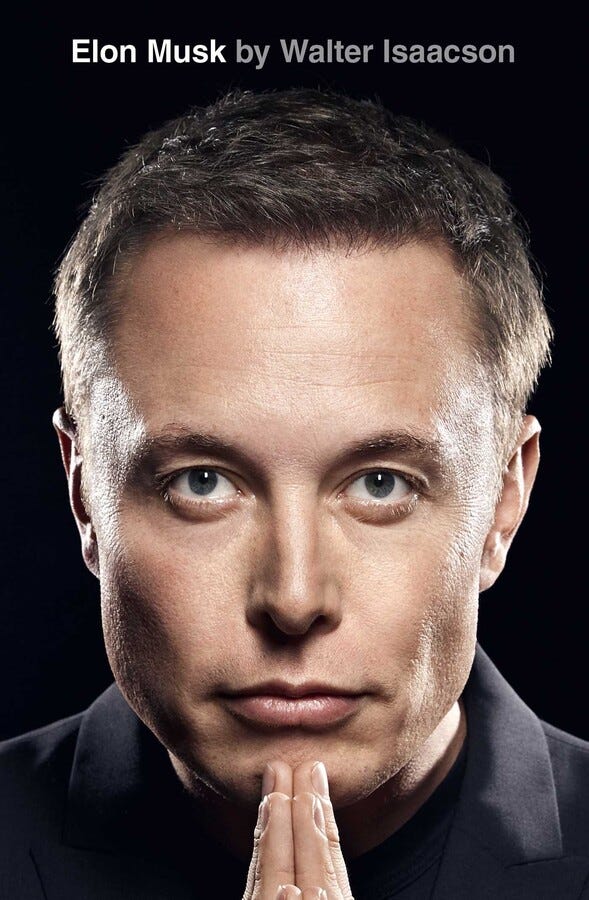There are a handful of sub-genres I go back to again and again.
For years I have been drawn to stories about tech bros behaving badly (Adam Neumann), promising young startups going kaput (Theranos) and general Silicon Valley chaos. I want — no, I NEED to know what goes on at these places and inside these minds.
So when I heard two of the most adept chroniclers of our time — Walter Isaacson and Michael Lewis — were following Elon Musk and SBF around (respectively), well, I couldn’t pre-order fast enough.
Elon Musk
by Walter Isaacson
Walter Isaacson is the closest thing the biographical world has to a celebrity. And so while you know, upon picking up one of his books, that his writing is going to open doors, you do not foresee just how many.
Isaacson’s behemoth bio of Musk clocks in at almost 700 pages, but makes for easy reading nonetheless thanks to relatively short chapters.
Featuring close and personal discussions — it would be wrong to call them interviews — with Musk’s vast and varied network, as well as with the man himself, this book is the most transparent look yet at one of the most controversial and impactful figures of our time.
Musk, like it or not, does not spend much time hiding who he really is, to us or to Isaacson. What we see is what we get, all 688 pages of it. Musk makes no attempt at opacity and readily shows Isaacson his faults and inner turmoil.
Isaacson, in turn, is a man who has been won over by his subject — and with good reason.
One imagines it would be difficult, upon spending so many hours with Musk, to not develop a personal relationship with him. That certainly comes across here, though not to the book’s detriment. Readers, too, are drawn into the candid world of the author and subject relationship and feel privy to what we otherwise would not. We are given a much more sympathetic telling than that of a biographer who has some distance from his subject — but at the same time, a much more accurate and intricate portrayal.
Much of the book focuses on the qualities that make Musk who he is, and how they came to be fundamental parts of his personality and worldview. Musk’s unrelenting adherence to constant First Principles questioning of everything, particularly rules and regulations, is the foundation on which most of his achievements are built.
We come to see how Musk became the real-life model for Ironman. But also here for the first time, a light is shed on what was going through his head at so many strange moments in the last few years (include the entire Twitter debacle). It is a real, honest and empathetic but critical look at the man behind the constant headlines.
Love him or hate him, I dare you not to be inspired.
Going Infinite+ The Rise and Fall of a New Tycoon
“I first heard about Sam Bankman Fried at the end of 2021 from a friend who, oddly enough, wanted me to help him figure out who he was,” Lewis tells us in the preface to this (oddly) short book. And so, our Mr. Lewis goes for a walk with SBF. Yada yada yada. “By the end of the walk I was totally sold. I called my friend and said something like, ‘Go for it! Swap shares with Sam Bankman-Fried! Do whatever he wants to do!’ What could possibly go wrong?”
Thus we rapidly discover just what could possibly go wrong.
I thought to myself, upon cracking the spine of this bad boy, my god, I cannot believe this man was following SBF around while this entire thing was going to shit! Flame covered shit making its way down a river of trash! How could the finished product be anything less than extraordinary?
I fear, however, Lewis managed to put out one of the more mundane portrayals of this extravaganza — maybe for the same reason Isaacson’s Musk is so spot on. Because Lewis got too close to his subject.
Look, I genuinely enjoyed this book. I am glad I read it. But, a closer look:
The way ML tells this story makes it difficult to follow at various points even as a reader quite familiar with the subject at hand. Especially as what’s involved is already a frayed tangle of incomprehensible terms and cryptic mumbo jumbo made impossible to follow by design. Lewis jumps back and forth between time periods, when this narrative would benefit from a linear telling, and operates on the underlying assumption that the reader is already familiar enough with what he’s talking about.
Whereas Isaacson injects his clear respect for Musk with a wry skepticism, Lewis sounds more like an idolatrous schoolboy watching one of his own takeover. I mean, the effective altruistic BS (SBF says he wanted to make a bunch of money to give it all away) is not on the receiving end of nearly enough attempts to puncture its thin veneer.
And when I say I wanted more, I mean I wanted SO MUCH MORE. Lewis barely goes beyond the tip of the iceberg in terms of some of the mind boggling dynamics of what played out between the main characters in here: SBF’s parents get glancing mentions, and we get only a small smattering of entries from Caroline Ellison’s wildly compelling online diary and letters to Sam.
Lewis left an unbearable amount on the table. For the life of me I can’t figure out why this book is so short, except that maybe he had to rush it out after FTX collapsed and is now at work on a second one?
One can only hope.



